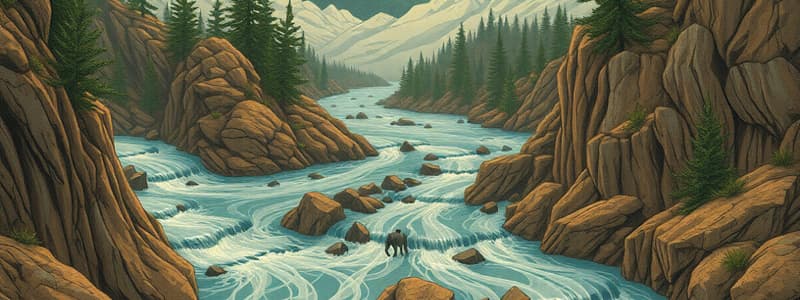Podcast
Questions and Answers
What does velocity refer to in the context of streams and rivers?
What does velocity refer to in the context of streams and rivers?
- The total amount of sediment transported
- The width of the river bank
- The depth of the riverbed
- The speed at which water moves (correct)
Which factor does NOT affect soil composition?
Which factor does NOT affect soil composition?
- Influence of plants and animals
- Climate conditions (correct)
- Time since decomposition
- Parent material
What happens when a river has a steep gradient, high velocity, and a large discharge?
What happens when a river has a steep gradient, high velocity, and a large discharge?
- Erosion will be minimal
- Erosion will be severe (correct)
- Water will slow down significantly
- Sediment will accumulate rapidly
What is deposition in the context of rivers?
What is deposition in the context of rivers?
Which of the following elements contributes to the weathering of rocks?
Which of the following elements contributes to the weathering of rocks?
What causes the formation of metamorphic rocks?
What causes the formation of metamorphic rocks?
Which of the following is NOT a formation condition for metamorphic rocks?
Which of the following is NOT a formation condition for metamorphic rocks?
What characterizes foliated metamorphic rocks?
What characterizes foliated metamorphic rocks?
Which type of metamorphic rock is formed from the remains of living organisms?
Which type of metamorphic rock is formed from the remains of living organisms?
What is the primary basis for the classification of metamorphic rocks?
What is the primary basis for the classification of metamorphic rocks?
Which of the following is not a cause of erosion?
Which of the following is not a cause of erosion?
What factor increases the severity of river erosion?
What factor increases the severity of river erosion?
Which description accurately defines glaciers?
Which description accurately defines glaciers?
Which term refers to the amount of water flowing past a point in a river?
Which term refers to the amount of water flowing past a point in a river?
How do glaciers contribute to erosion?
How do glaciers contribute to erosion?
What does soil primarily consist of?
What does soil primarily consist of?
Which factor contributes to the composition of soil over time?
Which factor contributes to the composition of soil over time?
What role do plants and animals play in soil formation?
What role do plants and animals play in soil formation?
Where do earthquakes primarily occur?
Where do earthquakes primarily occur?
What type of boundary involves tectonic plates sliding past each other?
What type of boundary involves tectonic plates sliding past each other?
What is weathering primarily concerned with?
What is weathering primarily concerned with?
Which of the following is NOT an agent of weathering?
Which of the following is NOT an agent of weathering?
What characterizes mechanical weathering?
What characterizes mechanical weathering?
What occurs during frost wedging?
What occurs during frost wedging?
In which environment is frost wedging most likely to occur?
In which environment is frost wedging most likely to occur?
What process involves the conversion of minerals into different substances due to reactions with water, acids, or oxygen?
What process involves the conversion of minerals into different substances due to reactions with water, acids, or oxygen?
Which of the following best describes hydrolysis in the context of chemical weathering?
Which of the following best describes hydrolysis in the context of chemical weathering?
What is the primary result of oxidation in minerals with iron?
What is the primary result of oxidation in minerals with iron?
Which natural agents are primarily responsible for the erosion and transport of weathered materials?
Which natural agents are primarily responsible for the erosion and transport of weathered materials?
Why is Mars characterized by a reddish appearance?
Why is Mars characterized by a reddish appearance?
What does specific gravity compare?
What does specific gravity compare?
Which formula is used to calculate density?
Which formula is used to calculate density?
What method can be used to measure the volume of a mineral?
What method can be used to measure the volume of a mineral?
If a mineral has a density of 5.43 g/cm³ and a mass of 19.12 g, what is its volume?
If a mineral has a density of 5.43 g/cm³ and a mass of 19.12 g, what is its volume?
Which of the following is NOT a type of rock based on its origin?
Which of the following is NOT a type of rock based on its origin?
What is the primary factor that differentiates intrusive igneous rocks from extrusive igneous rocks?
What is the primary factor that differentiates intrusive igneous rocks from extrusive igneous rocks?
What characteristic is typical of extrusive igneous rocks?
What characteristic is typical of extrusive igneous rocks?
Which statement is true regarding the composition of Earth's crust?
Which statement is true regarding the composition of Earth's crust?
How are sedimentary rocks primarily formed?
How are sedimentary rocks primarily formed?
Which type of sedimentary rock is primarily formed from broken pieces of other rocks?
Which type of sedimentary rock is primarily formed from broken pieces of other rocks?
What is the primary mechanism of frost wedging?
What is the primary mechanism of frost wedging?
Which of the following accurately describes chemical weathering?
Which of the following accurately describes chemical weathering?
What is hydrolysis in the context of weathering?
What is hydrolysis in the context of weathering?
What role do plants play in weathering?
What role do plants play in weathering?
Which of the following processes is primarily associated with abrasion?
Which of the following processes is primarily associated with abrasion?
What is meant by a mean solar day?
What is meant by a mean solar day?
What occurs at the Winter Solstice?
What occurs at the Winter Solstice?
Which of the following is a factor influencing the formation of seasons on Earth?
Which of the following is a factor influencing the formation of seasons on Earth?
What are Equinoxes characterized by?
What are Equinoxes characterized by?
What is a significant feature of time zones?
What is a significant feature of time zones?
Flashcards
Velocity
Velocity
The speed at which water flows in a river or stream.
Gradient
Gradient
The steepness of the slope a river or stream travels along.
Discharge
Discharge
The amount of water flowing past a point in a river in a given time.
Deposition
Deposition
Signup and view all the flashcards
Soil
Soil
Signup and view all the flashcards
Metamorphic Rocks
Metamorphic Rocks
Signup and view all the flashcards
Weathering
Weathering
Signup and view all the flashcards
Foliated Metamorphic Rocks
Foliated Metamorphic Rocks
Signup and view all the flashcards
Unfoliated Metamorphic Rocks
Unfoliated Metamorphic Rocks
Signup and view all the flashcards
Compaction in Metamorphic Rock Formation
Compaction in Metamorphic Rock Formation
Signup and view all the flashcards
Parent Material
Parent Material
Signup and view all the flashcards
Topography
Topography
Signup and view all the flashcards
Transform Boundaries
Transform Boundaries
Signup and view all the flashcards
Convergent Boundaries
Convergent Boundaries
Signup and view all the flashcards
Erosion
Erosion
Signup and view all the flashcards
Glacier
Glacier
Signup and view all the flashcards
Mechanical Weathering
Mechanical Weathering
Signup and view all the flashcards
Frost Wedging
Frost Wedging
Signup and view all the flashcards
Agents of Weathering
Agents of Weathering
Signup and view all the flashcards
Agents of Weathering
Agents of Weathering
Signup and view all the flashcards
Intrusive Igneous Rocks
Intrusive Igneous Rocks
Signup and view all the flashcards
Extrusive Igneous Rocks
Extrusive Igneous Rocks
Signup and view all the flashcards
Sediments
Sediments
Signup and view all the flashcards
Clastic Sedimentary Rocks
Clastic Sedimentary Rocks
Signup and view all the flashcards
Sedimentation
Sedimentation
Signup and view all the flashcards
Mean solar day
Mean solar day
Signup and view all the flashcards
Winds
Winds
Signup and view all the flashcards
Humidity
Humidity
Signup and view all the flashcards
Seasons
Seasons
Signup and view all the flashcards
Equinoxes
Equinoxes
Signup and view all the flashcards
What is chemical weathering?
What is chemical weathering?
Signup and view all the flashcards
What is hydrolysis?
What is hydrolysis?
Signup and view all the flashcards
What is oxidation?
What is oxidation?
Signup and view all the flashcards
What is erosion?
What is erosion?
Signup and view all the flashcards
What is soil?
What is soil?
Signup and view all the flashcards
Chemical Weathering
Chemical Weathering
Signup and view all the flashcards
Hydrolysis
Hydrolysis
Signup and view all the flashcards
Carbonic Acid
Carbonic Acid
Signup and view all the flashcards
Plant and Animal Action
Plant and Animal Action
Signup and view all the flashcards
Specific Gravity
Specific Gravity
Signup and view all the flashcards
Density
Density
Signup and view all the flashcards
Density Formula
Density Formula
Signup and view all the flashcards
Igneous Rocks
Igneous Rocks
Signup and view all the flashcards
Sedimentary Rocks
Sedimentary Rocks
Signup and view all the flashcards
Study Notes
### Rock Formation
- Rocks are broken down due to exposure to processes occurring at the Earth's surface by agents like water, waves, wind, gravity and glaciers.
- Two main types of weathering: Mechanical and Chemical.
- Mechanical weathering involves physical forces, breaking rocks into smaller pieces (no change in composition).
- Frost (ice) wedging is a type of mechanical weathering. Water freezes in cracks, expanding and pushing the rock apart. This occurs where there are frequent freezes and thaws.
- Chemical weathering involves chemical reactions that change the composition of minerals within rocks.
- Examples of chemical weathering are hydrolysis and oxidation.
- Hydrolysis is the breakdown of rocks by water.
- Oxidation is a reaction between rocks and oxygen. This often produces rust and changes the rock's color.
### Types of Rocks
-
Igneous rocks form from fire. 95% of the Earth's crust is igneous rocks. These form from cooling magma or lava
- Intrusive igneous rocks form when magma cools below the surface of the earth.
- Extrusive igneous rocks form when lava cools on the Earth's surface.
- Rapid cooling = smaller grains or crystals; fine-grained or glass or holes
- Slower cooling = larger grains or crystals.
-
Sedimentary rocks are made from other rocks (sediment) that are transported, broken and deposited by wind and water.
-
Sedimentary rocks have 3 main types
- Clastic
- Organic
- Chemical
-
Metamorphic rocks form from already existing rocks that have changed due heat, pressure, proximity of magma, and crustal movement.
-
Features include foliated (visible bands/layers), or unfoliated (no visible layers).
Studying That Suits You
Use AI to generate personalized quizzes and flashcards to suit your learning preferences.




